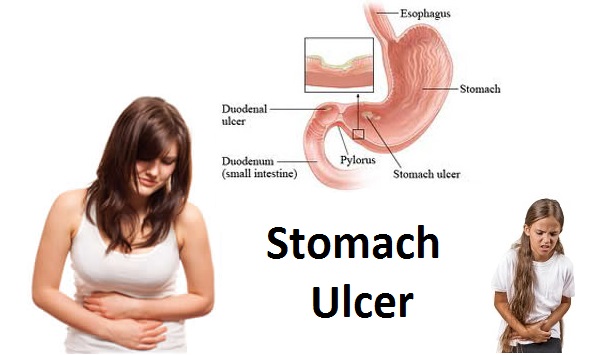Learn Stomach Ulcer Symptoms in Men, Women and Children. Stomach Ulcer also called Peptic Ulcer or Gastric Ulcer (ICD-9 531–53, ICD-10 K25–K27) is a breach in the mucosal lining of the stomach. Stomach Ulcer pain is due to an open wound(s) in the lining of the stomach or the upper portion of the small intestines which is known as duodenum. That’s why it is sometimes referred to as duodenum ulcer.
Although stomach ulcer is more common in older men above 50 years, it is some times a young women or child may also suffer from stomach ulcer.
Stomach Ulcer Symptoms in Children are hard to understand because, kids simply call it “belly pain”. While it may actually be something more serious like ulcer. Whether it is peptic or gastric ulcer, the pain is no different for a child.
Stomach Ulcer Symptoms may include variety of pain in the stomach with constipation, diarrhea or appendicitis. However, stomach ulcer pain is often confused with other digestive disorders that can cause stomach pains. A bacteria called Helicobacter Pylori is the most known Stomach Ulcer Cause through H. Pylori Infection.
However, Stomach Ulcer in Children is not as common as it is with adults men and women. Stomach ulcer in children may be developed as a secondary condition from more serious medical conditions or because of adverse reaction with NSAIDs such as aspirin and ibuprofen. Stomach ulcer symptoms in children are also different from adults. So before the child’s condition become worse, we, a child’s abdominal pain should be diagnosed that whether it is ulcer or a different kind of abdominal condition.
Stomach Ulcer Symptoms in Children
Please take immediate and urgent action when you see these more severe stomach ulcer symptoms in children:
- Stomach Ulcer Symptoms: Dark or Black Stool
This is mainly caused by bleeding. When the linings of the stomach is sore and no action is taken, inevitably, it will result to blood in bowel movements or in vomit with dark or black appearance. - Stomach Ulcer Symptoms: Abdominal Pain
Severe and intolerable pain in the middle and upper part of the abdominal area – Oftentimes, abdominal pain due to ulcer is temporarily relieved by filling the stomach with food. If that does not solve the problem and the kid is still complaining about his tummy aching very badly, it is best to bring your kid to the hospital for immediate attention and medication.
Stomach Ulcer Symptoms in Men, Women
Following are the common stomach ulcer symptoms in men, women and sometimes in children also:
- Burning Abdominal Pain
The most common stomach ulcer symptoms in children and adult is the almost intolerable burning pain in the abdomen area that starts from below the breastbone down to the belly button. It usually occurs a few minutes after a meal or when the stomach is empty. Children usually experience this burning pain in their stomachs in the middle of the night. It can be temporarily relieved by eating or by taking antacid medications. - Burping, Hiccuping, Belching
Frequent burping and/or hiccuping is also one of the most obvious stomach ulcer symptoms. This condition is also called belching. Kids and adults alike, try to relieve discomfort from ulcer by belching. It is because of the unwanted gas in the stomach of an ulcer-affected person. - Loss of Appetite
Loss of appetite and feeding difficulties that eventually lead to weight loss. Due to the extreme stomach discomfort that a kid feels, he/she may lose his/her appetite. When you see this stomach ulcer symptoms in children, do not think twice about calling your kid’s pediatrician immediately as this is a very alarming condition. - Bloating and Nausea
Another symptoms of stomach ulcer, which is more common in kid and women is bloating and nausea, especially after meals. In some cases vomiting may also occur. - Chest Pain and Heartburn
Chest pain and heartburn are also common symptoms of stomach ulcer. But these are uncommon in children experiencing stomach ulcer. Most people often misunderstand heartburn as something to do with the heart, but that is a common misconception. Heartburn happens when the acid from the stomach tries to reflux causing pain in the esophagus (the pain is similar to when a person is experiencing heart attack, hence the term “heartburn”).
Stomach Ulcer Treatment
Stomach Ulcer Treatment is different for kids and adults. Stomach ulcer treatment is children is determined by the following factors:
- The kid’s overall health and medical history. As mentioned earlier on, stomach ulcer in children may be a secondary condition from a more serious medical condition. Wrong medication might make your child’s condition even worse.
- The kid’s age. Treatment for all kinds of diseases, the dosage and frequency of medication differ per age gap.
- The seriousness of the ulcer. As discussed earlier, stomach ulcer symptoms in children are considered severe when there is blood in the kid’s bowel movement or when he/she vomits blood. This symptom requires urgent medication.
- The kid’s tolerance for medical procedures and specific medications. Your kid’s condition may worsen if his/her body cannot accept the medicines or develop allergy from them. Thorough tests are important in order to determine the kid’s tolerance for these medications or procedures.
- The parents’ or guardian’s opinion or preference. When it concerns our children’s health, a mother’s instinct kicks in. Please always keep in mind that whatever decision you make is very crucial to your child’s health and welfare.
Once it is determined that you or your kid is suffering from stomach ulcer due to H. pylori infection, it is very important to take the medications prescribed by the doctor, which are most commonly antibiotics. Even if the stomach ulcer symptoms are not obvious anymore, you still cannot be sure unless all of the medicines/antibiotics are taken.
On the other hand, if it was a medication-related ulcer, it is best to avoid nonsteroidal anti-inflammatory (NSAID) drugs as they can aggravate the ulcer. The doctor may also prescribe acid-reducing medicines.
Unless patient has a pre-existing allergy to a certain food, most doctors do not suggest any dietary restrictions, but a good diet should be observed. Junk food and other food or drinks that stimulate the body’s production of acid such as coffee and soda should be avoided. An increase in Vitamin E consumption is also helpful in treating ulcer. Some food are also good for minimizing the risk of ulcer like banana, honey, garlic, cabbage, licorice and capsaicin.
 Health & Care Information
Health & Care Information 


